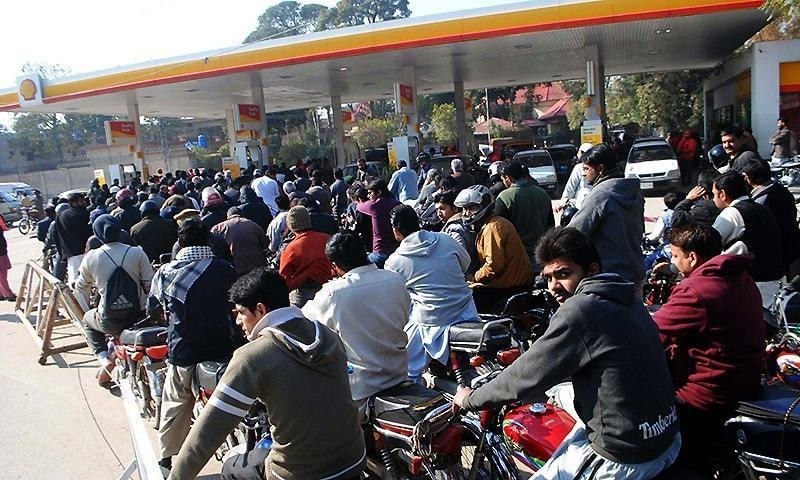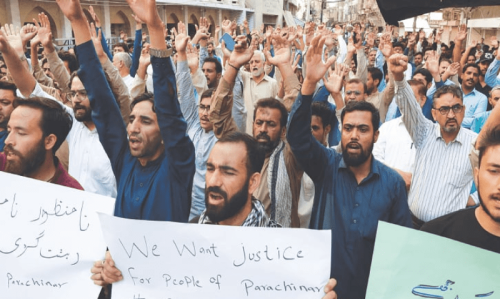LAHORE: The petrol crisis could only have been prevented had the government anticipated and taken early measures according to a fact-sheet released by the Institute for Policy Reforms on Sunday.
“There is another shortage waiting to happen as the total import of furnace oil has fallen sharply and the likelihood of even more power loadshedding is much higher today,” said the fact-sheet, terming the petrol crisis `a very serious governance failure.’
Take a look: Petrol supplies boosted to avoid crisis repeat
The crisis had been the consequence of deep structural problems in the energy sector that spilled over to the shortage of petrol. This had been compounded by serious problems of co-ordination among the multitude of ministries and agencies performing different functions within the sector.
The major importer of petroleum products has been the state-owned Pakistan State Oil (PSO) which imports 66 per cent of petrol with the remainder 34 per cent being imported by other oil marketing companies (OMCs).
PSO has serious liquidity problems because of non-payment for purchases of furnace oil, largely by the GENCOs, HUBCO and KEPCO. By September 2014, the receivables of PSO had risen to the colossal figure of Rs222 billion. In December, a number of L/Cs of PSO had not been honoured, greatly restricting its ability to import all petroleum products. In effect, a large part of the circular debt has been parked in the PSO.
The IPR fact-sheet said there had been some depletion of inventories of petrol with OMCs. These companies carried inventories to below the level of three weeks in order to minimise potential (inventory) losses of up to Rs7 billion at a time when prices were falling.
The decline in supply of petrol occurred when there was a big increase in demand due to a number of factors. By the beginning of January, with the 28pc cumulative fall in price, the demand increased in the range of 6pc to 8pc. Also the government announced the closure of CNG stations from mid-November for four months in Punjab, leading to bulge in petrol demand.
“First estimate is that the consequential increase in the demand nationally for petrol is over 10 per cent. Overall, the combined effect on demand of the fall in price and reduction in supply of CNG is 16 per cent. With declining supply in the presence of a big increase in demand, it was inevitable that sooner or later a shortage would take place.
“The crisis could only have been prevented if the government had anticipated (the crisis) and taken early measures to import more petrol, prevent a depletion of stocks and manage demand better.
“IPRs assessment is that the highest contribution to the petrol crisis was the strained liquidity position of PSO which severely restricted the ability to import. This is followed in importance by the depletion of inventories, closure of CNG stations in Punjab and rise in demand due to the fall in price.
“Also, it is not surprising that the crisis first manifested itself in the largest province due to the additional factor of closure of CNG stations,” said the IPR fact-sheet.
Since PSO has a share of 91 per cent in the import of furnace oil, its constrained ability to import has had a greater impact on its overall availability. Consequently, the likelihood of even more power loadshedding has been much higher.
“Besides ensuring accountability for the debacle of different ministries and agencies, there is need for coordinated and urgent action on the part of the government on a number of fronts. First, there has to be an immediate injection of funds into PSO by the Ministry of Finance of up to Rs100 billion. Second, the problem of mounting circular debt has to be tackled much more vigorously by the Ministry of Water and Power to ensure that PSO does not find itself in the same crippled position once again. Third, Ogra may consider raising the required level of stocks with OMCs to at least one month’s cover and develop an adequate monitoring mechanism with penalties.
“Prices of petroleum products should be deregulated fully. The role of the Competition Commission of Pakistan must be to prevent the emergence of any cartels. Finally, the Ministry of Petroleum and Natural Resources must develop the capacity to forecast and monitor supply and demand better and play a more aggressive management role within the petroleum sector,’ suggests the fact-sheet.
Published in Dawn January 26th , 2015
On a mobile phone? Get the Dawn Mobile App: Apple Store | Google Play














































